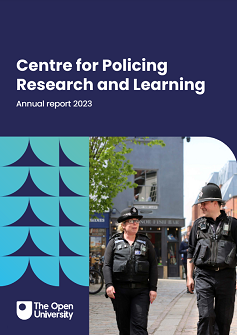You are here
- Home
- Research
- Theme 2: Digitally enabled policing
- 2.20 Can coercive control behaviour be identified through Machine Learning?
2.20 Can coercive control behaviour be identified through Machine Learning?
Academic team: Professor Arosha Bandara (C&C/CPRL, OU), Dr Min Zhang (C&C, OU), Ian Kenny (C&C, OU)
Policing partners: Avon and Somerset Police
Status: In progress

Pilot project: Exploring data inventory and ethical issues
This project is inspired by Jane Monckton-Smith’s research and her book “In Control: Dangerous Relationships and How They End in Murder” (Monckton-Smith, 2021) together with increasing awareness of the challenges of addressing violence against women and girls, and the relevance of coercive control to this issue. Based on this, the teams overall research aim is to investigate whether coercive control behaviours can be identified through automated data analysis techniques.
The team would like to understand if this is achievable by combining and analysing a variety of data sources (e.g., Interview notes from different public service agencies, victim statements, incident reports, victim self-reports, witness reports, safeguarding reports, police case files). This requires recognition of patterns of behaviour by perpetrators and patterns of experiences of victims. These include but are not limited to isolation from support networks; limiting autonomy; gaslighting; limiting access to resources; name calling; bullying; controlling healthcare; making threats, jealousy, stalking etc., including where these behaviours are facilitated by digital technologies – i.e., digital coercive control (Harris & Woodlock, 2019)
In this pilot project, the team will explore the feasibility of the overall goal by investigating the data that is available for this purpose alongside the relevant ethical issues that arise. To this end, the team will design a survey that can be completed by different stakeholders relevant to coercive control behaviour investigations, with the aim of determining the different data types available. This will be informed by a literature review to identify relevant research in machine learning for identifying behaviours and identities in the policing domain. In addition to naming the data types, the survey would aim to identify the primary owner / controller of each data type, the format of the data (e.g., structured, unstructured, text, audio, video, etc), and the volume of data associated with each type. Finally, the survey would also ask participants to highlight ethical issues that they consider relevant to the use of the data to detect potential coercive control behaviours. As part of the analysis of the data, we would assess the potential of different data types to be used by machine learning algorithms.
News
- Launch of Openlearn Policing Practice and Leadership Hub 14th May 2024
- Ten-years of Policing at the OU 5th April 2024
- Launch of CPRL Small Grants Pilot Scheme: Testing Policing Innovations 26th March 2024
Upcoming Events
Online Seminar: Trust and confidence in policing
Wednesday, May 22, 2024 - 13:00 to 14:30
The understanding of domestic abuse in the criminal justice system- current issues, challenges and developments
Thursday, June 6, 2024 - 09:30 to 16:30
The Open University, Milton Keynes
Contact: Book your place
